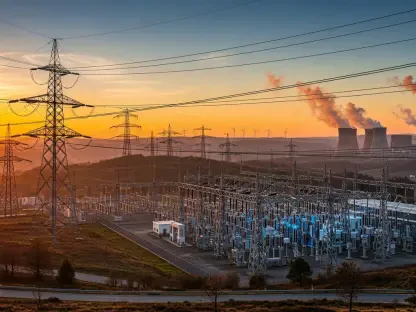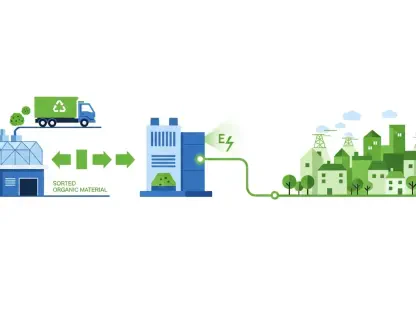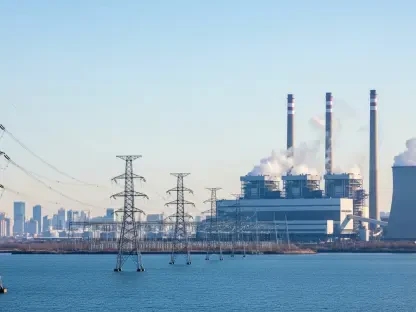In a world where sustainability is becoming a critical concern, Veolia North America’s second annual Triple Net Zero Industry Progress Report sheds light on the progress of global companies toward achieving net-zero goals in carbon emissions, water usage, and waste management. The report, based on interviews with 300 major corporations spanning 12 industries and 60 countries, underlines the pressing issue of corporate sustainability driven by growing pressure from investors, regulators, and the general public. While many corporations recognize the importance of sustainable practices, the question remains—are these efforts in line with public expectations and concerns about climate change?
Disparity Between Corporate Action and Public Perception
One of the most striking themes uncovered in Veolia’s report is the significant disparity between corporate action and public perception regarding climate change. Even though 98% of companies acknowledge the importance of sustainability in their operations, a mere 30% view climate change as a high risk to their business continuity. This stark contrast becomes even more evident when juxtaposed with Veolia’s Barometer of Ecological Transformation 2024 survey, which reveals that an overwhelming 89% of the public perceives climate disruption as a real and immediate threat. A substantial proportion of the public feels exposed and vulnerable to the risks posed by climate change, thus highlighting a disconnect between corporate priorities and public concerns.
The difference in perspectives points to a critical need for corporations to better understand and align their sustainability strategies with the public’s climate-related anxieties. Public pressure is an ever-growing force that drives corporate behavior, but for meaningful environmental progress, companies need to bridge this perception gap. While notable figures suggest that the public is far more attuned to the realities of climate change, companies must evolve their perspectives and policies. This could ensure their efforts resonate more profoundly with the communities they serve and contribute to a more sustainable future shared by all.
Immediate Opportunities in Water and Waste Management
The report reveals specific areas where companies can make immediate and impactful progress, particularly in water and waste management. Despite significant advancements in decarbonization efforts, fewer than 20% of companies possess an in-depth understanding of how to achieve their water and waste reduction goals effectively. This knowledge gap underscores the necessity for companies to prioritize and intensify their efforts in these aspects of sustainability. When considering that water scarcity and waste management are critical components of broader environmental challenges, addressing these “low hanging fruit” can yield substantial benefits in the short term.
Moreover, the report highlights the potential for immediate improvements in these areas, which not only align with environmental goals but also present cost-saving opportunities for businesses. By focusing on improving water usage efficiency and enhancing waste management practices, companies can achieve meaningful sustainability outcomes while also improving their operational efficiencies. The need for a more concentrated approach to these elements of sustainability can’t be overstated, as they form the foundation upon which more complex and ambitious sustainability targets are built.
Importance of Education and Partnerships
Another crucial aspect the report emphasizes is the role of education and partnerships in advancing corporate sustainability programs. Although 72% of companies believe they are on track to meet their sustainability targets, only 21% have advanced sustainability programs already in place. This significant discrepancy indicates that while companies are aware of and committed to sustainability, many lack the advanced frameworks and strategies necessary for rapid and effective execution. The development of robust sustainability programs, fueled by comprehensive education and collaboration with industry stakeholders, is essential for true transformation.
Public support for joint commitments to ecological transformation is extraordinarily high, with 90% of citizens advocating for collaborative efforts across various sectors. This public endorsement underscores the necessity for companies to not operate in silos but rather to engage in partnerships that can accelerate the adoption of advanced sustainability practices and technologies. By collaborating with governments, NGOs, and other key stakeholders, corporations can leverage shared knowledge and resources to overcome common barriers such as costs, knowledge gaps, and reporting complexities.
Regional Differences and Common Challenges
In an era where sustainability is becoming increasingly crucial, Veolia North America’s second annual Triple Net Zero Industry Progress Report sheds light on the advancements global companies are making toward achieving net-zero objectives in carbon emissions, water usage, and waste management. This comprehensive report is based on interviews with 300 leading corporations across 12 industries and 60 countries. It highlights the urgent issue of corporate sustainability, driven by mounting pressure from investors, regulators, and the public.
Although many corporations are aware of the significance of sustainable practices, there’s an ongoing debate on whether their efforts align with public expectations and concerns about climate change. The report’s findings suggest that while progress is being made, questions remain about the adequacy and pace of these initiatives in addressing the broader environmental challenges. The gap between corporate actions and public demand raises important discussions about the future trajectory of sustainability efforts and the role of businesses in mitigating climate impacts.









